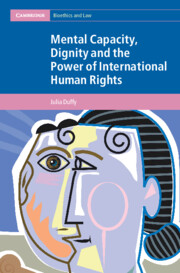Book contents
- Mental Capacity, Dignity and the Power of International Human Rights
- Cambridge Bioethics and Law
- Mental Capacity, Dignity and the Power of International Human Rights
- Copyright page
- Dedication
- Contents
- Acknowledgements
- Table of Cases
- Table of Treaties
- Abbreviations
- 1 Introduction and Background
- 2 Article 12 – Context and Background
- 3 The Principle of Indivisibility and Article 12
- 4 Article 12 and Autonomy
- 5 Article 12 and Dignity
- 6 Article 12 and Equality
- 7 Conclusion
- References
- Index
- Cambridge Bioethics and Law
1 - Introduction and Background
Published online by Cambridge University Press: 03 August 2023
- Mental Capacity, Dignity and the Power of International Human Rights
- Cambridge Bioethics and Law
- Mental Capacity, Dignity and the Power of International Human Rights
- Copyright page
- Dedication
- Contents
- Acknowledgements
- Table of Cases
- Table of Treaties
- Abbreviations
- 1 Introduction and Background
- 2 Article 12 – Context and Background
- 3 The Principle of Indivisibility and Article 12
- 4 Article 12 and Autonomy
- 5 Article 12 and Dignity
- 6 Article 12 and Equality
- 7 Conclusion
- References
- Index
- Cambridge Bioethics and Law
Summary
This chapter introduces the research problem – how to interpret Article 12 of the Convention on the Rights of Persons with Disabilities (‘CRPD’) – the right to legal capacity on an equal basis with others. There is contention as to whether Article 12 allows for decision-making by substitutes as a last resort in ‘hard cases’, or whether people with cognitive disability can always be supported to make their own decisions and have their legal capacity recognised. The chapter explains how the CRPD developed against a history of people with disability being excluded as subjects of human rights, so that the convention was hailed as a ‘paradigm shift’. It introduces the book’s argument that interpreting Article 12 through the principle of the indivisibility and independence of human rights means that in ‘hard cases’ decision-making by a substitute may be required to recognise an adult’s human dignity and achieve inclusive equality.
- Type
- Chapter
- Information
- Publisher: Cambridge University PressPrint publication year: 2023



